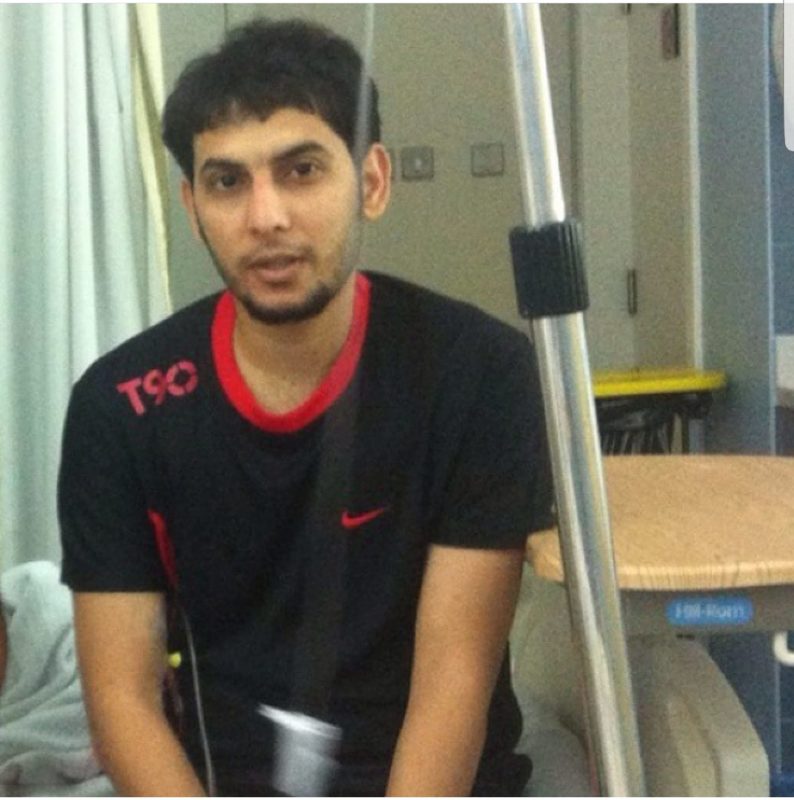Husain Ali Saad was a 28-year-old Bahraini citizen when he was unlawfully arrested, arbitrarily detained and subjected to enforced disappearance, torture and abuse by Bahraini authorities. He was arbitrarily arrested by officers from the Ministry of Interior along with two of his friends. When he was arrested, Husain was a freelancer who lived with his mother and siblings; he is still in prison to this day.
Husain was arrested on 11 December 2013 from a house close to his parents’ in Bani Jamra, Bahrain, along with two of his friends. Officers from the Ministry of Interior, including riot police, security police officers and Criminal Investigations Directorate officers completed the arrest, while the area around the house was filled with police cars and armed forces. These officials arrested Husain without presenting an arrest warrant and claimed that the reason behind it was Husain’s involvement in political terrorist activities. During the arrest, Husain was beaten with batons all over his body and on his head repeatedly in front of his crying mother, who wasn’t allowed to talk to him. They even beat him more every time she attempted to address him, handcuffed his hands and put him in the car to take him away, directly to the Criminal Investigations Directorate.
Following his arrest on 11 December 2013, Husain was subjected to enforced disappearance for five days, until 16 December 2013, when his family received a phone call from him disclosing that he was in the Criminal Investigations Directorate. Two weeks later, Husain called his family again to let them know that he was detained in the Dry Dock Detention Center. Although Husain’s family does not have enough information about what happened during Husain’s interrogation, around that same period, he was transferred to the Salmaniya Hospital because of his deteriorating health that resulted from the several forms of severe torture he was subjected to. He was also taken to a farm in the countryside, where he was made to re-enact, on film, charges brought against him related to ownership of weapons and ownership of a weapons-filled warehouse. He was also subjected to ill-treatment and constant insults.
Husain was charged with several cases, including: 1) Establishing and funding of terrorist groups, 2) Possession of weapons, 3) Reporting to and dealing with terrorist groups, 4) Illegal Assembly and rioting, and others. One of the first cases Husain was charged with was known as the ‘case of the 61 accused’. Its judgement was issued on 11 January 2015 by the First High Criminal Court. On 26 November 2015, he was sentenced to 5 years in prison, then on 2 June 2016 he was convicted with illegal assembly and rioting. He was also sentenced to 10 years as well as life in prison, but for unknown cases and charges.
When Husain was transferred to the Dry Dock Detention center he suffered from constant teasing from the prison guard, severe forms of torture, beatings, physical abuse, insults and ill-treatment. As a result of all these violations, Husain suffered from many injuries and negative effects on his health; he underwent hearing impairments in his left ear, body aches and gallbladder pains. His gallbladder was later removed under surgery. Even after leaving the hospital post-surgery, he was very poorly treated and harassed by the guards. Husain also has severe Sickle Cell Anemia and used to have frequent seizures as a result. However, he did not receive any proper treatment for this major health issue. After his first judgement, issued on 11 June 2015, he was transferred to Jau prison. Throughout his stay there, he and his inmates suffered from severe harassment and abuse from the prison guards who treated the prisoners very poorly, by confiscating their personal belongings, not letting them go to the clinic, and forcing them to live in very poor conditions. As a result of the long endured ill-treatment, Husain, along with almost 500 prisoners in Buildings 13 and 14 of Jau Prison, went on a strike for almost two weeks at the beginning of July 2020; the prisoners stopped all contact with their families to protest prison conditions and demand basic rights as human beings. The protests stopped based on promises from the prison management to achieve the prisoners’ demands.
Husain’s family filed many complaints to several organizations, such as the Red Cross Foundation, the National Insititute for Human Rights, and the Ministyry of Interior Ombudsman office, for what he was subjected to during his arrest and the ill-treatment and torture he faced during detention and in prison. The family also filed a special complaint for the treatment he endured after leaving the hospital following the surgery he underwent in December 2013.
The authorities’ actions against Husain are in direct violation of several national and international treaties and of the Bahraini Constitution. Torture, beatings, abuse, arbitrary arrests, and unjust trials all go against the Bahraini Constitution and several international obligations to which Bahrain is party, such as the Convention Against Torture and Other Cruel, Inhuman or Degrading Treatment or Punishment (CAT), the International Covenant on Civil and Political Rights (ICCPR), and the International Covenant on Economic, Social and Cultural Rights (ICESCR).
Americans for Democracy and Human Rights (ADHRB) calls upon the Bahraini Government to abide by the international human rights standards and their obligations in promoting and protecting human rights. ADHRB requests holding perpetrators accountable for the severe torture and ill-treatment Husain endured. ADHRB further requests authorities to provide appropriate medical care for Husain, knowing his fragile health situation, and to keep his family informed of his condition and whereabouts.





